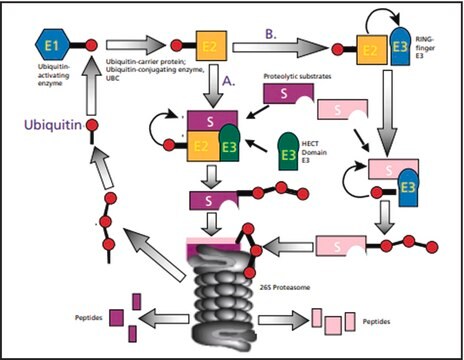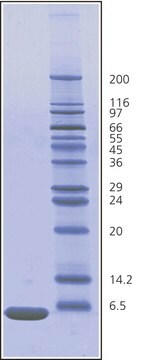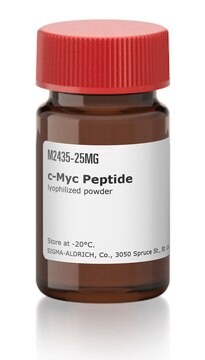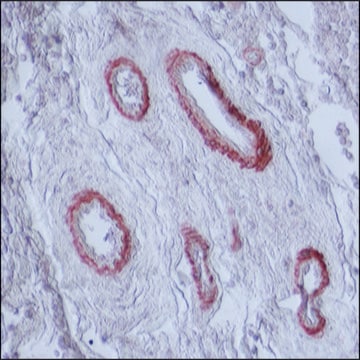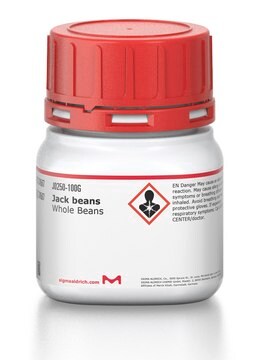14-1121
MultiDsk-Ubiquitin-binding protein reagent
This MultiDsk-Ubiquitin-binding protein reagent is validated for use in Affinity Precipitation Assays for the pull-down of mono- and poly-ubiquitinated proteins.
Synonim(y):
Dsk-Ubiquitin-binding protein reagent, Ubiquitin domain-containing protein DSK2
Zaloguj sięWyświetlanie cen organizacyjnych i kontraktowych
About This Item
Kod UNSPSC:
12352203
eCl@ss:
32160702
NACRES:
NA.41
Polecane produkty
Opis ogólny
MultiDsk - Ubiquitin-binding protein reagent is a GST fusion protein containing an array of five ubiquitin-associated (UBA) domains from the yeast Ub-binding protein Dsk2 (aa 327-373; UniProt P48510). MultiDsk binds and protects ubiquitinated proteins from deubiquitination. When immobilized on glutathione resins, MultiDsk can be used for affinity pull-down of mono- and poly-ubiquitinated proteins from cell extracts and tissue homogenates. This construct also contains a C-terminal 6xHis sequence and an internal 6xHis sequence between the N-terminal GST and the 5XUBA sequence (PMID 23056298). MultiDsk is expressed in and purified from Rosetta (DE3)pLysS strain of E. coli (Cat. No. 70956).
Product Source: Yeast protein, with a GST tag and a His tag, expressed in e. coli.
Specyficzność
Mono- and poly-ubiquitinated proteins
Immunogen
Epitope: Ubiquitin
This is an protein reagent, not an antibody as it is a yeast protein, with a GST tag and a His tag, expressed in e. coli.
Zastosowanie
Affinity Precipitation Assay Analysis: A representative lot of MultiDsk-Ubiquitin-binding protein was immobilized on agarose beads and used to precipitate ubiquitinated proteins from yeast and HEK293 whole cell extracts. (Wilson, D.M., et al. (2012) PLoS One. 7(10):e46398).
Affinity Precipitation Assay Analysis: A representative lot of MultiDsk-Ubiquitin-binding protein was immobilized on agarose beads and used to pull down ubiquitinated proteins from yeast whole cell extracts. (Wilson, D.M., et al. (2013) Cell. 154:983-995).
Affinity Precipitation Assay Analysis: A representative lot of MultiDsk-Ubiquitin-binding protein was immobilized on agarose beads and used to pull down ubiquitinated proteins from yeast whole cell extracts. (Wilson, D.M., et al. (2013) Cell. 154:983-995).
Jakość
Evaluated by Affinity Precipitation in yeast whole cell extract.
Affinity Precipitation Assay Analysis: Ubiquitinated proteins were isolated from 1.0 mg yeast whole cell extract by MultiDsk-Ubiquitin-binding protein reagent (7.8 ug to 31.3 ug MultiDsk per pull-down) immobilized on agarose beads
Affinity Precipitation Assay Analysis: Ubiquitinated proteins were isolated from 1.0 mg yeast whole cell extract by MultiDsk-Ubiquitin-binding protein reagent (7.8 ug to 31.3 ug MultiDsk per pull-down) immobilized on agarose beads
Postać fizyczna
Format: Purified
Purified ubiquitin-binding protein in buffer containing 25mM Tris-HCl pH7.5, 150mM NaCl, 2mM β-mercaptoethanol with 50% glycerol without preservatives.
Przechowywanie i stabilność
Stable for 1 year at -80°C from date of receipt.
Shipped on Dry Ice. Upon delivery aliquot and store at -80°C. Avoid freeze / thaw cycle
Shipped on Dry Ice. Upon delivery aliquot and store at -80°C. Avoid freeze / thaw cycle
Komentarz do analizy
Multiple bands observed.
Inne uwagi
Concentration: Please refer to lot specific datasheet.
Ta strona może zawierać tekst przetłumaczony maszynowo.
Kod klasy składowania
10 - Combustible liquids
Klasa zagrożenia wodnego (WGK)
WGK 2
Temperatura zapłonu (°F)
Not applicable
Temperatura zapłonu (°C)
Not applicable
Certyfikaty analizy (CoA)
Poszukaj Certyfikaty analizy (CoA), wpisując numer partii/serii produktów. Numery serii i partii można znaleźć na etykiecie produktu po słowach „seria” lub „partia”.
Masz już ten produkt?
Dokumenty związane z niedawno zakupionymi produktami zostały zamieszczone w Bibliotece dokumentów.
MultiDsk: a ubiquitin-specific affinity resin.
Wilson, MD; Saponaro, M; Leidl, MA; Svejstrup, JQ
Testing null
Proteasome-mediated processing of Def1, a critical step in the cellular response to transcription stress.
Wilson, MD; Harreman, M; Taschner, M; Reid, J; Walker, J; Erdjument-Bromage, H; Tempst et al.
Cell null
Nasz zespół naukowców ma doświadczenie we wszystkich obszarach badań, w tym w naukach przyrodniczych, materiałoznawstwie, syntezie chemicznej, chromatografii, analityce i wielu innych dziedzinach.
Skontaktuj się z zespołem ds. pomocy technicznej
